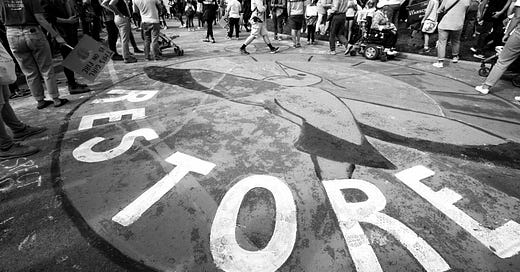My heart has been feeling heavy as of late. It all started with Climate Week, I suppose.
For those who don’t know, Climate Week is run by the Climate Group, a non-profit that seeks to drive climate action. It’s an international event, with its first held in 2009 in NYC alongside the UN General Assembly. Because of its origins, New York, as it usually does, has the largest event of this kind. The city hosts hundreds of events related to climate change, climate solutions — which the media refers to as “The Burning Man for Climate Geeks.”
I’ve lived in NYC for two years at this point, and have never attended Climate Week. I made it a goal to attend this year, because why not? I am interested in environmental issues, so I was curious how the wider world, outside of journalism, was talking about climate change.
So on the last week of September, I bumbled around New York, attending a couple of walks and talks in between work and interviews. I wasn’t sure what I was expecting, but I certainly wasn’t expecting the melancholy that would hit my soul afterward. I think namely, the sadness was because I realized how much we still lack in terms of a framework to talk about climate change, and disasters in general.
Most by now, I hope, know about the greenhouse gases and how that traps heat in the atmosphere, and how our planet is drastically warming, pushing environmental devastation in many places. It’s a narrative I’ve heard much in my youth, and it’s one that’s always incited existential panic in my bones. Climate change has long needed other stories, stories of solutions and how to be a human in times of crisis and powerlessness. And yet, Climate Week has shown that the environmental activism movement is still a scattered mass of voices, screaming for things to be seen, for pain to be felt. Or perhaps even more disappointingly, Climate Week was flooded with companies that have co-opted our need for soothe existential dread for their own profit: a lot of head-patting about nothing.
At the tail end of Climate Week, Hurricane Helene struck much the Southeast of the United States. In stark contrast of NYC’s corporate glitz and glam, countless videos emerged, showing how the monster storm put the mountain towns of western North Carolina underwater. It has become even more clear that climate change now has tangible effects, and yet there’s no way for people affected, and looking on, to process such devastation. This anguish, of course, is not confined to environmental issues, as Israel continues to inflict widespread destruction on Gaza and the broader Middle East.
Since my expertise is within the environmental space, I’ll keep my comments focused on those topics. And one thing I did learn from Climate Week is that disaster science, our understanding of our society’s capacity to respond and recover from natural disasters, is less than five years old. Less than five years old! That means we know very little about how to respond and recover from the massive events that are affecting millions of people around the world. It means we lack answers for big questions like: How do we rebuild lives? How do we heal, logistically and emotionally, from loss?
Recently, I’ve started looking for those answers in the past. This was kicked off by an archival piece I did for my fellowship at Audubon magazine, where I learned how the early figures in the wildlife conservation movement shaped how the industry works today, for better or for worse. Now, as a freelance journalist, I’ve gone down other rabbit holes, from early thought leaders of natural history, to pioneering researchers in psychology and social science, focusing how the dominant and powerful voices back then has shaped these fields of study and knowledge. I do believe that in order to understand the events of today, to figure out where things went wrong and how to (try to) make them better — we have to understand how we got here. So right now, I’m just doing the background readings to catch up on the things I didn’t learn in my STEM degree.
Will it make a difference to any of the things I lamented on in this newsletter? Probably not. I, after all, write silly little stories about science. Regardless, I hope it adds something good to the world anyways, as much as I can.
Some related readings: These women are trying to humanize the climate crisis | The 19th, A Glimpse At The Future If We Get Climate Action Right | Atmos, On Climate Week and Toxic Positivity | Drilled News, Here's how to help victims of Hurricane Helene | NBC News
Some less-related readings: Invisible Trauma | Grist, I Followed Common Advice for Making Friends. Then I Learned What It Really Takes. | Slate
As for my own stories, haven’t published as much in the past month, but currently working on some cool things! Stay tuned.




